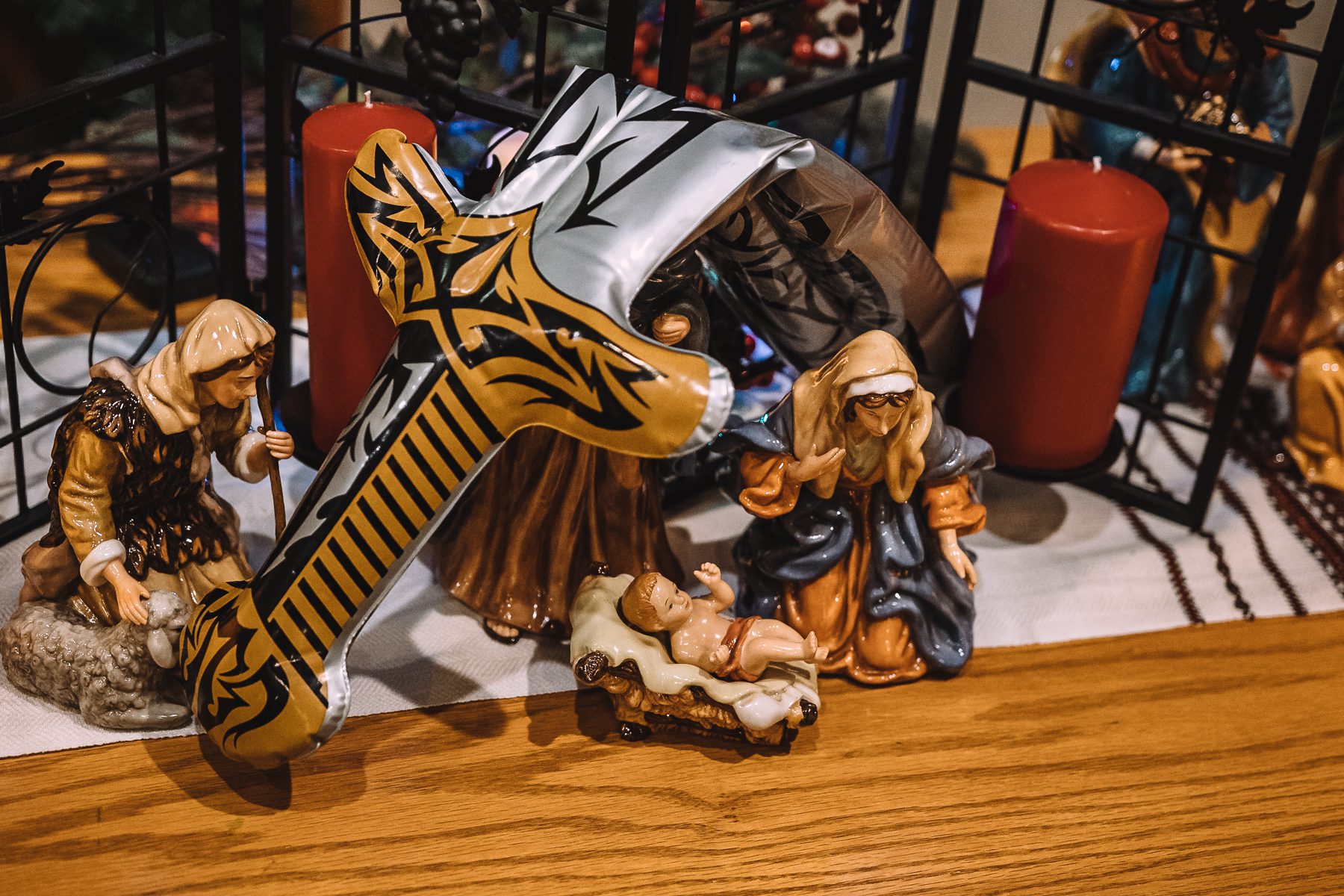
“What do you think about putting a sword in the display at the front of the church on Christmas Eve?”
One of the decorators at church asked me a week before Christmas.
“It makes sense biblically,” I told her after thinking about it.
First, of all there’s the Matthew 2:13–18 story of King Herod’s killing of the babies in Bethlehem. Then there’s Simeon’s prophecy to Mary when Jesus was eight days old, “…and a sword will pierce your soul” (Luke 2:35).
However, I expressed concern that a child might take that sword off the nativity display and start swinging it.
On fourth Advent after the Sunday service, an inflatable sword appeared, towering over the nativity scene. It was quite striking, seemingly out of place with the tranquil scene.
By Christmas Eve, the sword had deflated. The decorator blew it up and placed it back in the display.
During the program, the sword suddenly shifted and leaned against Joseph. It was again losing air.
Then the choir stood to sing and filled the stage, obscuring my view of the nativity display. When the choir sat down, the sword had flopped right over Joseph.
This, it occurred to me, was visual poetry illustrating the sermon I was about to preach on Galatians 4:4–5.
“But when the right time came, God sent his Son, born of a woman, subject to the law. God sent him to buy freedom for us who were slaves to law, so that he could adopt us as his very own children” (New Living Translation).
What made it the right time for Jesus to be born?
- The nation into which he was born had lost its independence to a foreign occupier.
- Jesus’ mom had conceived him out of wedlock. New Testament scholar Kenneth E. Bailey writes that in her home town there would have been “forces that no doubt wanted her stoned….Why did Joseph take Mary with him to Bethlehem for the registration? The easiest explanation is that he was unsure what might happen to her if he left her in Nazareth without his presence to protect her.”
- Not long after his birth the paranoid and power-hungry local ruler Herod issued an order for the child’s death (Matthew 2:16), necessitating Joseph, Mary, and Jesus to flee.
How is it the right time for a child to be born when he and his family are ostracized in the home village, under death sentence from the governor, and turned into refugees?
- “A mindless, bloody atrocity took place at the birth of Jesus,” Bailey writes. “After reading that story, the reader is not caught unawares by the human potential for terror that shows its ugly face again on the cross.”
- Jesus experienced great trouble during his life on earth. He understands what you and I go through, and is willing and able to help us overcome our own troubles when we ask him (Hebrews 4:15–16).
- Finally, the sword didn’t win. An angel warned Joseph to escape to safety in Egypt (Matthew 2:13).
The sword didn’t accomplish its objective in Bethlehem because God is stronger than human evil.
It didn’t win 33 years later because God took all that hatred on himself, died to pay the penalty for it, and then rose from the dead to prove his death was sufficient to break the power of all that evil and to reconnect with divine life.
The sword did not win.
And that’s the beauty of the deflated sword flopped over the nativity scene.
Postscript: On Christmas Day, I received a text message from my daughter, whose family had been in the service the previous night.
With her children, she was watching an animated retelling of the nativity story which depicted the soldiers in Bethlehem. Her five-year-old daughter became frightened, but, in the scene where Joseph is warned in a dream, exclaimed “I know what happens! The sword didn’t win! Just like we heard yesterday.”
A minute later, my daughter texted again: “They’re now discussing why King Herod wanted the baby Jesus dead. She continues to repeat ‘The sword did NOT WIN!’”
Marvin Dyck is pastor of Crossroads Mennonite Brethren Church, Winnipeg. A version of this article first appeared on www.crossroadsmb.ca/crossroads-blog.html.
References
William Barclay, The Daily Study Bible: Matthew Vol. 1
Kenneth E. Bailey, Jesus Through Middle Eastern Eyes